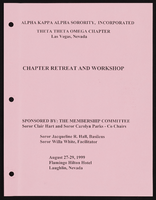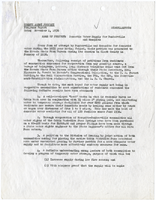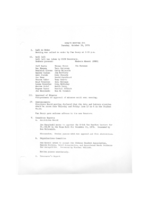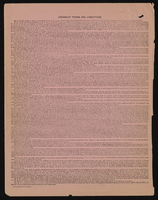Search the Special Collections and Archives Portal
Search Results
Las Vegas African American Community Conversations round table interviews
Identifier
Abstract
The Las Vegas African American Community Conversations is a four-part conversation with local Las Vegans. The first part of the round table is moderated by Trisha Geran with a central theme of "Migration, Work and Community Emergence." The panelists discuss the early history of the African American community in Las Vegas, Nevada. They also discuss how and why their families moved to Las Vegas, most citing the economic opportunities as a major factor. The participants share their personal histories and family histories building up the African American community in downtown Las Vegas and the Westside. The second part of the round table is moderated by Sonya Horsford with a central theme of "Education, Economy, and Integration." The panelists discuss the Clark County School District pre- and post-integration. They discuss the hardships of the Sixth Grade Center Integration Plan on the African American community as well as discussing the differences in the school facilities. The round table participants also discuss the social services and social programs and the history of those programs from the African American perspective. They also discuss civic involvement and the various civic groups started by the panelists, and share discrimination they faced.
The third part of the round table is moderated by Claytee D. White with a central theme of "Civil Rights and Entertainment." The panelists discuss the racism and segregation present in Las Vegas and discuss how African American community leaders worked to integrate African Americans into the Las Vegas community. They discuss the 1969 riots in detail, and discuss African American entertainers and the entertainment industry. They share personal experiences working in the entertainment industry and discuss the importance of the local unions, such as the Culinary Workers Union Local 226, the International Alliance of Theatrical Stage Employees Local 720, and their contributions to the unions. The fourth and final part of the round table is moderated by Rachel Anderson with a central theme of the "Early African American Legal Community." The panelists discuss the foundations of the professional legal community in Las Vegas, noting the contributions of Charles Keller, Dr. William Bailey, and the Reverend Marion Bennett as driving forces for civil rights activism in Las Vegas. They share their experiences growing up in Las Vegas facing discrimination and segregation. Lastly, they share the changes they have seen and how both the legal and African African communities have grown.
Archival Collection

Alpha Kappa Alpha Sorority, Theta Theta Omega Chapter retreat and workshop agenda and documents
Date
Archival Collection
Description
From the Alpha Kappa Alpha Sorority, Incorporated, Theta Theta Omega Chapter Records (MS-01014) -- Chapter records file.
Text

County agent project progress report, Domestic water supply for Bunkerville and Mesquite, November 1, 1936
Date
Archival Collection
Description
Having been unsuccessful in obtaining reliable domestic water, Bunkerville and Mesquite were beginning an all-out lobbying campaign on various agencies for help.
Text
Rabbi Yocheved Mintz Photographs
Identifier
Abstract
The collection is comprised primarily of photographs of Rabbi Yocheved Mintz at different events and programs held at Las Vegas, Nevada synagogue Congregation P'nai Tikvah from 2006 to 2017. The collection includes photographs of congregants during different workshops and events held at the synagogue. The collection also includes photographs of Rabbi Mintz and congregants during holidays (Hannukah, Purim, Rosh Hashanah, and Passover), Jewlicious (Jewish education classes and workshops), and from the congregation newsletter.
Archival Collection
John S. Wright Faculty Papers
Identifier
Abstract
The John S. Wright Faculty Papers (1951-1975) are comprised of faculty papers from and about Dr. John S. Wright who was considered one of the founding faculty members at the University of Nevada, Las Vegas (UNLV). The collection documents Wright's involvement in establishing UNLV as a separate university from the University of Nevada, Reno. The collection includes memoranda, correspondence, meeting minutes, and reports from different committees Wright was a part of including Academic Council, Faculty Senate, and other ad hoc committees.
Archival Collection

Meeting minutes for Consolidated Student Senate, University of Nevada, Las Vegas, October 26, 1976
Date
Archival Collection
Description
Text
Set of photographs including Attorney Charles L. Kellar, wrestling at Fremont, May Young vs. Pearl Beihn, Ulysses Winfry, and Steve's Shop
Date
Archival Collection
Description
Photographer's notations: Attorney Charles L. Keller, Wrestling at Fremont, May Young vs. Pearl Beihn 7-6-67, Ulysses Winfry, Steve's Shop.
Image


